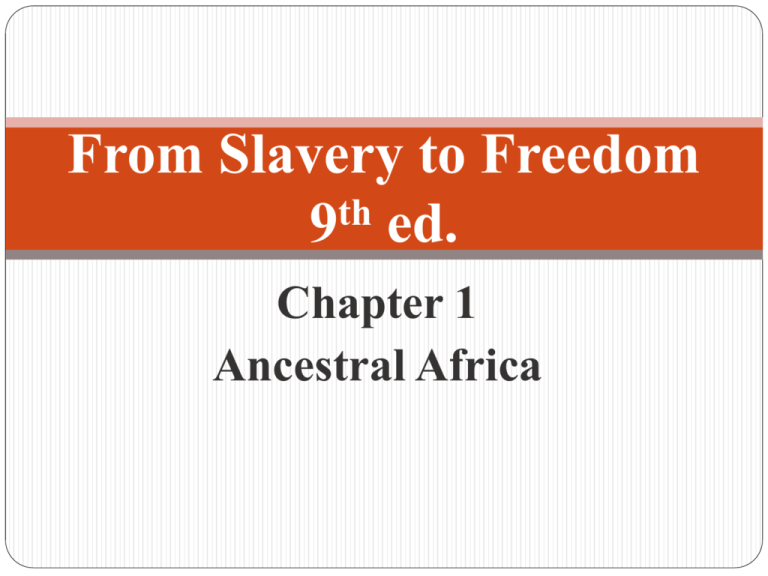
From Slavery to Freedom
th
9 ed.
Chapter 1
Ancestral Africa
An Ancient Land and People
Ecology of Africa
Most of Africa in tropics; northern and southern
tips have moderate, Mediterranean climate
Various ecological zones distinguishable in
West Africa
Ecological diversity affected social development
Significant change in ecology over time;
desiccation
2
© 2010 The McGraw-Hill Companies, Inc. All Rights Reserved.
African
climate and its
impact on
development
3
© 2010 The McGraw-Hill Companies, Inc. All Rights Reserved.
An Ancient Land and People
The Bantu Migration
About 2,000 African languages can be classified
into four linguistic groups:
Kosian (southern); Afro-Asiatic (northern); Nilo-
Siharan (north-central); Niger-Congo (equatorial and
southern)
Most native languages belong to the Niger-
Congo group
4
This linguistic dominance believed to be the result of a twowave migration of Bantu speakers
The first wave eventually met with the second, creating an
interconnectedness among various groups
© 2010 The McGraw-Hill Companies, Inc. All Rights Reserved.
An Ancient Land and People
Iron Technology
Production of steel as early as 600 B.C.E.
Nok people important early iron-age society
Nok Pottery and Sculpture
Nok terracotta figures dating from 500 B.C.E. to
200 C.E. are oldest evidence of advanced,
organized society in the sub-Sahara
Copper Technology
Use of copper and copper alloy widespread
5
© 2010 The McGraw-Hill Companies, Inc. All Rights Reserved.
Early Commercial Networks
West African Trade Routes
Ecological conditions necessitated specialization
and trade
Trans-Saharan trade connected West Africans
with people and goods from distant places
Gold, Africa’s most valuable trade item
Specific groups, known as dyula, dominated
long-distance trade
Used complex system of weights and measures, money
Developed a contact language to communicate
Earliest converts to Islam
6
© 2010 The McGraw-Hill Companies, Inc. All Rights Reserved.
Trans-Saharan trade routes
7
© 2010 The McGraw-Hill Companies, Inc. All Rights Reserved.
Early Commercial Networks
Interregional Trade
Ethnic groups linked into regional networks by
inland waterways
Trade facilitated by great West African rivers –
the Niger, the Gambia, the Benue, and the Volta
– and interlacing lakes, lagoons, and streams
Merchants used slaves and draft animals to carry
cargo along overland trade routes
Internal Slave Trade
Many slaves came from the decentralized interior
8
© 2010 The McGraw-Hill Companies, Inc. All Rights Reserved.
West Africa river system
9
© 2010 The McGraw-Hill Companies, Inc. All Rights Reserved.
African Slavery
African Slavery
Slavery existed from earliest known history of
Africa
Slavery in European Communities
Unfree status not unique to Africa
Coerced labor, chattel slavery, serfdom common in
Europe in the Middle Ages
Slaves in Africa
Many slaves used to carry goods on trade routes
Most slaves in Africa were women
10
© 2010 The McGraw-Hill Companies, Inc. All Rights Reserved.
African Slavery
Slaves and Status
Slave ownership validated status and prosperity
“Continuum” of unfree status
Some slaves able to amass wealth and influence
Slaves in the Economy
Importance to economy varied among states
Prevalence of slaves and slave-owning classes
set stage for commercial network linking
Europeans and complicit Africans in slave trade
11
© 2010 The McGraw-Hill Companies, Inc. All Rights Reserved.
The Great Empires
Ghana’s Trading Empire
11th century – Ghana had large army and
lucrative trade across Sahara
Imports exchanged for ivory, slaves, and gold
King taxed imports and exports
Late 11th century economic decline brought on
by drought
12
© 2010 The McGraw-Hill Companies, Inc. All Rights Reserved.
The Great Empires
Mali’s Rise
Emergence as a power in 1235
Successful revolt under Sundiata Keita gave
Mali control over internal trade routes
Mansa-Musa ruled from 1312 to 1337
Mansa-Musa’s Pilgrimage
Pilgrimage to Mecca and Medina in 1324
Mali became powerful and well-organized
political state
Influence did not decline until early 15th century
13
© 2010 The McGraw-Hill Companies, Inc. All Rights Reserved.
Mansa Musa portrait on
fourteenth-century Catalan atlas
14
© 2010 The McGraw-Hill Companies, Inc. All Rights Reserved.
The Great Empires
The Rise of Songhay
Songhay rose to power under Sonni Ali
Built river navy
Achieved dominance in West Africa
Askia Muhammad’s Reforms
Reigned from 1493 to 1529
Songhay most powerful state in West African history
Askia Muhammad instituted many social, political and
economic reforms after trip to Mecca in 1497
15
Most significant reforms were educational
© 2010 The McGraw-Hill Companies, Inc. All Rights Reserved.
View of the city of Timbuktu
16
© 2010 The McGraw-Hill Companies, Inc. All Rights Reserved.
The Great Empires
Dichotomy of Sovereignty
Division between central and local authority
Kings sensitive to possibility of conflict within
their territories
17
© 2010 The McGraw-Hill Companies, Inc. All Rights Reserved.
Other States
Other States
Village states flourished in 15th and 16th centuries
The Mossi States
Five loosely confederated states
Governors of each state composed council of
state
Efficient political and military system
Emperor was absolute
18
© 2010 The McGraw-Hill Companies, Inc. All Rights Reserved.
Other States
The Hausa States
Hausa city-states grew from trade relations with
other African states and North Africa
Each city retained its own identity
The Kingdom of Benin
Known for bronze and copper artistry
Also wielded substantial military might
Artistic renderings show veneration of both male
and female authority
19
© 2010 The McGraw-Hill Companies, Inc. All Rights Reserved.
Other States
The Christian Kongo
Voluntarily converted to Catholicism under king
Nzinga a Nkuwu
Baptized by Portuguese; established trade and religious
relations with them
In Kongo, Africans controlled church
Catholic worship melded with indigenous beliefs
Ndongo-Matamba
Queen Njinga spent most of reign fighting off
Portuguese encroachment
20
© 2010 The McGraw-Hill Companies, Inc. All Rights Reserved.
Other States
Great Zimbabwe
Benefited from control of gold, ivory, and cattle
Famous for stone walls and towers, elliptical
building
Linked to Swahili coastal trade
The Swahili Coast
Peopled by African, Arab, Persian, and Indian
traders
11th century on, blended African and Arab ways
21
© 2010 The McGraw-Hill Companies, Inc. All Rights Reserved.






